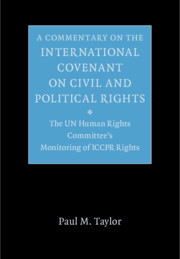 A Commentary on the International Covenant on Civil and Political Rights
A Commentary on the International Covenant on Civil and Political Rights Published online by Cambridge University Press: 11 June 2020
Article 11 is closely related to Article 8(2), which requires proscription against being held in ‘servitude’. That term comprises two practices of relevance: debt bondage, typically associated with feudal systems of slave labour, but also found in various contemporary forms of exploitation; and bonded labour, which still survives within the traditional practices of certain countries. Among the differences between Articles 8 and 11 is that Article 11 precludes imprisonment as a consequence of inability to fulfil a contractual obligation, whereas servitude within Article 8 typically concerns exploitation for commercial gain devoid of any contractual background.
To save this book to your Kindle, first ensure no-reply@cambridge.org is added to your Approved Personal Document E-mail List under your Personal Document Settings on the Manage Your Content and Devices page of your Amazon account. Then enter the ‘name’ part of your Kindle email address below. Find out more about saving to your Kindle.
Note you can select to save to either the @free.kindle.com or @kindle.com variations. ‘@free.kindle.com’ emails are free but can only be saved to your device when it is connected to wi-fi. ‘@kindle.com’ emails can be delivered even when you are not connected to wi-fi, but note that service fees apply.
Find out more about the Kindle Personal Document Service.
To save content items to your account, please confirm that you agree to abide by our usage policies. If this is the first time you use this feature, you will be asked to authorise Cambridge Core to connect with your account. Find out more about saving content to Dropbox.
To save content items to your account, please confirm that you agree to abide by our usage policies. If this is the first time you use this feature, you will be asked to authorise Cambridge Core to connect with your account. Find out more about saving content to Google Drive.